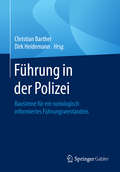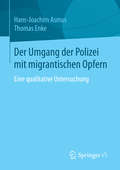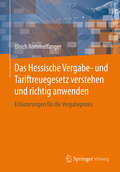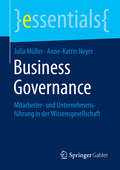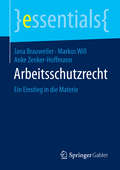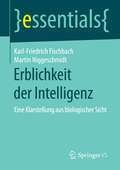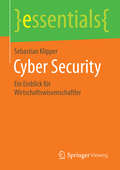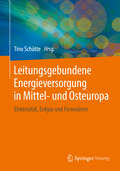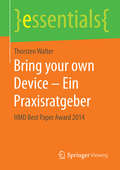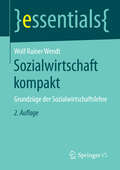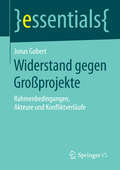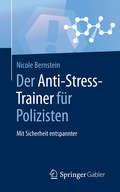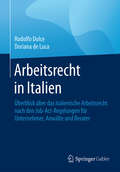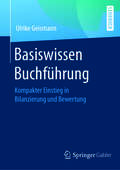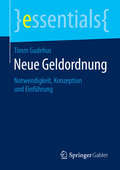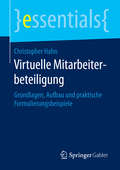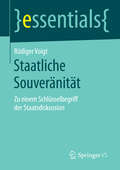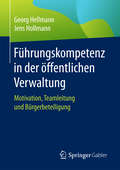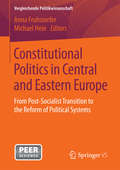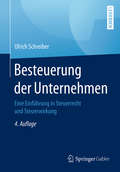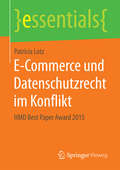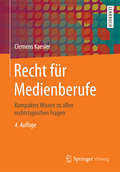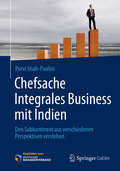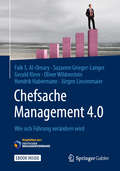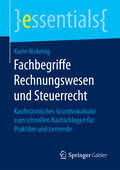- Table View
- List View
Führung in der Polizei
by Christian Barthel Dirk HeidemannDas Herausgeberwerk ist ein Plädoyer für eine organisationssoziologisch fundierte Führungskonzeption, die am Beispiel der Polizei wichtige Ansätze bündelt und ihre Brauchbarkeit in theoretischer wie praktischer Hinsicht dokumentiert. Die Polizei ist ein interessantes Feld, um Probleme der Führung zu diskutieren, weil sie durch vergleichsweise steile Hierarchien gekennzeichnet ist und dennoch komplexe Führungssituationen aufweist, die durch die Hierarchie selbst kaum bearbeitet werden können. Außerdem verfügt die Polizei über ein offizielles Führungssystem, das "Kooperative Führungssystem" (KFS), das als Leitbild und als "verbindliche Handlungsorientierung" Geltung beansprucht. Das KFS stammt aus den 1970er-Jahren und ist geprägt von den instrumentellen Lösungsansätzen, die einerseits auf klassische Motivationsansätze, aber auch auf eine unreflektierte Vorgesetztenfunktion zurückgreifen, die man als heroisch und in heutiger Zeit kaum mehr realistisch bezeichnen muss. Die Autoren präsentieren verschiedene organisationssoziologische Ansätze, um deutlich zu machen, dass eine angemessene Rekonstruktion des Führungsprozesses nicht nur im Sinne eines erweiterten theoretischen Blickwinkels, sondern auch für die Bearbeitung komplexer Führungssituationen praktisch brauchbarer ist.
Der Umgang der Polizei mit migrantischen Opfern
by Hans-Joachim Asmus Thomas EnkePolizeiliche Unsensibilität im Umgang mit Migranten(opfern) ist kein singuläres sondern ein systemisches Phänomen, dessen Ursachen, Reproduktionsmechanismen und Rechtfertigungen im Mittelpunkt der vorliegenden Untersuchung stehen. Die Vorschläge für eine Anreicherung der kulturellen Kompetenz der Polizeibeamtinnen und -beamten aller Hierarchieebenen beruht auf diesen Erkenntnissen. Als ,,Verfassungsarbeiterin" ist die Polizei verpflichtet, in ihrem Handeln die Grundrechte zu wahren. Soweit ihr normativer Anspruch, ihre normative Bindung und die Erwartungen des Bürgers. Ihre Einsatzpraxis gegenüber den verschiedenen kulturellen Gruppen wird jedoch - durch verschiedene Ereignisse hervorgerufen - immer wieder in der medialen Öffentlichkeit und Politik kritisiert.
Das Hessische Vergabe- und Tariftreuegesetz verstehen und richtig anwenden: Erläuterungen für die Vergabepraxis
by Ulrich RommelfangerSeit dem 1. M#65533;rz 2015 gilt das Hessische Vergabe-und Tariftreuegesetz (HVGT), das f#65533;r zahlreiche #65533;ffentliche Auftraggeber wie auch f#65533;r Bieter von Auftr#65533;gen und Bauleistungen einschneidende Ver#65533;nderungen bei der Auftragsvergabe mit sich bringt. Diese Kurzkommentierung erl#65533;utert kompakt und verst#65533;ndlich die wesentlichen Inhalte des HVGT und seine korrekte Anwendung in der Praxis.
Business Governance: Mitarbeiter- und Unternehmensführung in der Wissensgesellschaft (essentials)
by Julia Müller Anne-Katrin NeyerJulia Müller und Anne-Katrin Neyer erläutern in kompakter Weise, basierend auf ausgewählten Forschungsbeiträgen der Mitarbeiter- und Unternehmensführung, die Instrumente, die Ziele und die Situationen der Business Governance und deren Zusammenhänge. Anhand der Business Governance Formel zeigen die Autorinnen, dass Instrumente der Mitarbeiter- und Unternehmensführung so zu wählen sind, dass sie im Einklang mit Unternehmenszielen und -situationen stehen. Durch das ganzheitliche Konzept der Business Governance können Führungskräfte - wenn sie Business Governance im Unternehmen (vor)leben - Unternehmen zielgerichtet in die richtige Richtung führen.
Arbeitsschutzrecht: Ein Einstieg in die Materie (essentials)
by Jana Brauweiler Markus Will Anke Zenker-HoffmannJana Brauweiler, Markus Will und Anke Zenker-Hoffman stellen den umfangreichen und heterogenen Themenbereich des Arbeitsschutzrechts in Deutschland übersichtlich und kompakt vor. Sie erlauben es dadurch dem Leser, sich schnell einen Überblick zu verschaffen oder wesentliche Aspekte des Arbeitsschutzrechts, das in Deutschland im dualen System geregelt und überwacht wird, zu wiederholen. Während staatliche Einrichtungen für die Gesetzgebung und deren Umsetzung in Form von Verordnungen, Verwaltungsvorschriften und Erlassen zuständig sind, erlassen Berufsgenossenschaften ergänzend dazu Unfallverhütungsvorschriften und konkretisierende Durchführungsanweisungen. Abschließend gehen die Autoren auch auf Haftungsfragen unterschiedlicher Mitarbeitergruppen ein.
Erblichkeit der Intelligenz: Eine Klarstellung aus biologischer Sicht (essentials)
by Karl-Friedrich Fischbach Martin NiggeschmidtDieses Kompendium greift ein umstrittenes Thema auf: Ist Intelligenz erblich? Bei der Beantwortung dieser Frage geraten selbst Fachleute ins Schwimmen. Schuld daran sind missverständliche Fachbegriffe und überzogene Vorstellungen von der Aussagekraft des in der Intelligenzforschung genutzten Erblichkeitsmodells. Karl-Friedrich Fischbach und Martin Niggeschmidt erläutern das Modell aus Sicht der Biologie - jenes Wissenschaftsbereichs also, in dem es ursprünglich entwickelt wurde. Wer sich die Logik des Modells vergegenwärtigt, stellt fest: Intelligenz als ,,erblich" zu bezeichnen, ist unpräzise und irreführend.
Cyber Security: Ein Einblick für Wirtschaftswissenschaftler (essentials)
by Sebastian KlipperIn diesem Buch erfahren Wirtschaftswissenschaftler, wie Firmen nach Hackerangriffen vom Markt verschwinden und wie Hacker Aktienkurse beeinflussen können. Lernen Sie, wie Homo oeconomicus beim Thema Cyber Security zum Homo carens securitate wird und wie es gelingt, mithilfe der wirtschaftswissenschaftlichen ,,Brille" (oder: Perspektive/Sicht) ganz neue Lösungsansätze und Sichtweisen im Kampf gegen Wirtschaftsspione, Hacker und Cyber-Kriminelle zu erkennen. Cyber Security bzw. IT-Sicherheit ist ein Zukunftsthema, an dem kaum jemand vorbeikommt. Dieses Buch beschreibt anhand aktueller Vorfälle - ohne technisches Grundwissen vorauszusetzen -, was Ökonomen wissen müssen, um sich am Gespräch über eines der wichtigsten Zukunftsthemen unserer Zeit beteiligen zu können.
Leitungsgebundene Energieversorgung in Mittel- und Osteuropa: Elektrizität, Erdgas und Fernwärme
by Andrea Simon Tino Schütte Emil Dvorský Olga Borozdina Arvydas Galinis Géza Mészáros Vaclovas Miškinis Edyta Ropuszyńska-Surma Gunta Šlihta Kaspars Šlihta Kvetoslava Šoltésová Jaroslav Šoltés Zdzisław Szalbierz Magdalena Węglarz Lenka Raková Martin SirovýEine funktionierende leitungsgebundene Energieversorgung ist Voraussetzung für die industrielle Entwicklung eines Landes. Das Buch gibt einen fundierten Überblick über die Strom-, Gas- und Fernwärmeversorgungssysteme in den Ländern der Visegrad-Gruppe, des Baltikums sowie Russlands, Belarus und der Ukraine. Gleichzeitig werden Ansatzpunkte zur Modernisierung der Energienetze offengelegt. Nationale Besonderheiten und Entwicklungsstände werden aufgezeigt. Durch die abgestimmte Struktur der Beiträge ist ein Vergleich der Systeme möglich. Die Länderberichte sind von ausgewiesenen Fachleuten der betreffenden Staaten verfasst. Sie spiegeln die seit 25 Jahren bestehende Zusammenarbeit im Rahmen des Zittauer Energieseminars zur energiewirtschaftlichen Situation in Mittel- und Osteuropa wider. Jeder Beitrag beinhaltet eine technisch-ökonomische Sachstandsanalyse und geht auf Entwicklungsperspektiven ein. Das Werk zeigt Verbesserungspotentiale bzgl. Infrastrukturausbau und Energieeffizienz auf.
Bring your own Device - Ein Praxisratgeber: HMD Best Paper Award 2014 (essentials)
by Thorsten WalterThorsten Walter beschreibt die technischen und juristischen Fallstricke sogenannter ,,Bring your own device"-Modelle und stellt die arbeitsrechtlichen Regelungsinstrumente für den Umgang mit BYOD vor. Darüber hinaus werden die verschiedenen technischen Lösungen zur Umsetzung von BYOD im Unternehmen in leicht verständlicher Form einander gegenübergestellt. Der Autor gibt praktische Empfehlungen zur Gestaltung von Regelungen in Nutzungsvereinbarungen.
Sozialwirtschaft kompakt: Grundzüge der Sozialwirtschaftslehre (essentials)
by Wolf Rainer WendtDieses essential enthält eine kurze und prägnante Darstellung der Theorie sozialen Wirtschaftens. Es erhellt den Handlungsbereich der personenbezogenen Wohlfahrtsproduktion im sozialen Versorgungssystem und im organisierten Zusammenwirken professioneller, frei engagierter und selbstbetroffener Akteure. In der Sozialwirtschaftslehre wird die Erbringung sozialer und gesundheitsbezogener Leistungen institutionell und funktional begriffen.
Widerstand gegen Großprojekte: Rahmenbedingungen, Akteure und Konfliktverläufe (essentials)
by Jonas GobertDas essential zeigt Interessenkonflikte auf, die bei umstrittenen Großvorhaben regelmäßig entstehen, und analysiert die zentralen Akteursgruppen inklusive ihrer Organisationsstrukturen, ihrer Handlungslogik und ihrer politischen Strategien. Zunächst werden die wichtigsten rechtlichen Rahmenbedingungen der Planung und Genehmigung von Großvorhaben beschrieben. Anschließend erläutert Jonas Gobert die Instrumente des Widerstands und die zentralen Argumentationen der Konfliktparteien sowie die Rezeption in den Medien. Drei aktuelle Fallbeispiele bekannter Großprojekte verdeutlichen seine Ausführungen.
Der Anti-Stress-Trainer für Polizisten: Mit Sicherheit entspannter (Anti-Stress-Trainer)
by Nicole BernsteinIm vorliegenden Anti-Stress-Trainer sollen Stressoren aus unterschiedlichen Tätigkeitsbereichen der Polizei – ohne Anspruch auf Vollzähligkeit – anhand von Beispielen dargestellt und Tipps zur Stressbewältigung gegeben werden. Beleuchtet werden von möglichen Laufbahnwechseln über die Vereinbarkeit des Berufs mit der Familie und die Einflüsse auf das Privatleben bis hin zu gefährlichen oder traumatisierenden Einsätzen ganz verschiedene Bereiche. Soziale Netzwerke und Messenger sind heute omnipräsent und haben somit als eigener Einflussfaktor ebenfalls Eingang in dieses Buch gefunden.Das Werk richtet sich an alle dienstlichen Ebenen der Polizei und soll auch gleichzeitig für BewerberInnen eine Entscheidungshilfe sein, sich für diesen Beruf im Sinne einer Berufung zu entscheiden.
Arbeitsrecht in Italien: Überblick über das italienische Arbeitsrecht nach den Job-Act-Regelungen für Unternehmer, Anwälte und Berater
by Rodolfo Dolce Dorianna De LucaErster deutscher Praxisleitfaden zum reformierten italienischen Arbeitsrecht mit den aktuellen Bestimmungen: Von der Personalsuche über die Einstellung bis zur Beendigung eines Arbeitsverhältnisses bietet das Werk einen relevanten und praktischen Überblick, insbesondere für ausländische Unternehmer, die in Italien Personal beschäftigen bzw. dies beabsichtigen. Das Buch richtet sich außerdem an Berater, Rechtsanwälte und Steuerberater, die Unternehmen begleiten oder sich über das italienische Arbeitsrecht informieren möchten. Das als «Job Act» bezeichnete Reformpaket der Regierung Renzi ist seit 2014 in Kraft.
Basiswissen Buchführung: Kompakter Einstieg in Bilanzierung und Bewertung
by Ulrike GeismannDieses Buch vermittelt einen konzentrierten Einstieg in den Prozess des Buchens. Schnell versetzt es den Leser in die Lage, die Systematik der Buchf#65533;hrung zu verstehen und eigenst#65533;ndig einen kleinen Jahresabschluss von der Er#65533;ffnungsbilanz am Jahresanfang bis hin zur Schlussbilanz am Jahresende mit allen dazugeh#65533;rigen unterj#65533;hrigen Buchungen zu erstellen. Auch die diversen Bewertungsfragen der Handels- und Steuerbilanz werden ber#65533;cksichtigt. Dieses Basiswissen wird in allen kaufm#65533;nnischen Ausbildungsberufen und fast allen kaufm#65533;nnischen Studieng#65533;ngen ben#65533;tigt.
Neue Geldordnung: Notwendigkeit, Konzeption und Einführung (essentials)
by Timm GudehusTimm Gudehus begründet in diesem essential die Notwendigkeit einer neuen Geldordnung und beschreibt ihre Vorteile und Chancen. Die Ausführungen sollen dazu anregen, die vorliegenden Vorschläge für eine neue Geldordnung kritisch zu prüfen, bessere Lösungen zu entwickeln, die Einführungsmöglichkeiten zu diskutieren und offene Fragen zu beantworten. Das Werk richtet sich an alle, die verstehen wollen, wie das heutige Geldsystem funktioniert, und die an der Entwicklung und Einführung einer Geldordnung mitwirken möchten, mit der sich die zentralen Probleme des heutigen Geldsystems beheben und die Gefahren unseres Wirtschafts- und Finanzsystems begrenzen lassen.
Virtuelle Mitarbeiterbeteiligung: Grundlagen, Aufbau und praktische Formulierungsbeispiele (essentials)
by Christopher HahnDas essential vermittelt einen Einblick in den Aufbau, die Funktionsweise und typische Regelungen eines ,,Virtual Share"-Programms zur Mitarbeiterbeteiligung. Der Autor erläutert die Bedeutung der Mitarbeiterbeteiligung als Bestandteil einer zeitgemäßen Unternehmenskultur sowie die Notwendigkeit für junge Unternehmen, ihren strategisch wichtigen key persons besondere Incentives zu bieten, mit denen der Verzicht auf ein höheres Gehalt und Sicherheit im Vergleich zu einer Beschäftigung in einem etablierten Unternehmen kompensiert werden kann. Die virtuelle Mitarbeiterbeteiligung als ein solches Incentive lässt sich rechtlich einfach und schnell umsetzen, und die gesellschaftsrechtliche Position der Gründer und Investoren bleibt davon grundsätzlich unberührt. Das essential enthält zahlreiche Musterformulierungen, die die Umsetzung in die Praxis erleichtern.
Staatliche Souveränität: Zu einem Schlüsselbegriff der Staatsdiskussion (essentials)
by Rüdiger VoigtDas essential erläutert zunächst die Begriffsgeschichte und Bedeutung der Souveränität für den Staat des 21. Jahrhunderts und beschreibt die drei Typen Parlamentssouveränität, Rechts- bzw. Verfassungssouveränität sowie (direkte) Volkssouveränität. Anschließend analysiert der Autor den Begriff der nationalstaatlichen Souveränität im Kontext der Globalisierung, Internationalisierung sowie Europäisierung und stellt die Auswirkungen des globalen Finanzkapitalismus auf die nationalstaatliche Souveränität dar. Die Übertragung von Kernkompetenzen an die Europäische Union bei gleichzeitigem Souveränitätsverlust der Mitgliedstaaten und die Kontroverse zwischen Universalisten, Nationalisten und Partikularisten werden kritisch diskutiert. Abschließend liefert das essential Ansatzpunkte zu einer Erneuerung der Volkssouveränität im demokratischen Rechtsstaat.
Führungskompetenz in der öffentlichen Verwaltung: Motivation, Teamleitung und Bürgerbeteiligung
by Jens Hollmann Georg HellmannDie Autoren zeigen in diesem Buch mit vielen Beispielen aus der Praxis, wie Führung in der öffentlichen Verwaltung mit modernen Führungstools erfolgreich gestaltet werden kann. Die Verantwortung für Verwaltung und Politik ist hoch und wird zunehmend komplexer. Nicht nur Mitarbeiter, auch Bürger haben hohe Erwartungen an eine zeitgemäße Verwaltung. Nachweislich braucht es für Führungskräfte nicht nur Qualifikationen zur Motivations- und Teamführung, sondern auch Partizipationskompetenz, mit der Fähigkeit, Verwaltung transparenter zu gestalten und Impulse der Bürger in die Zukunftsstrategie auf Landes- und Kommunalebene einzubinden.
Constitutional Politics in Central and Eastern Europe: From Post-Socialist Transition to the Reform of Political Systems (Vergleichende Politikwissenschaft)
by Anna Fruhstorfer Michael HeinThe contributions to this edited volume discuss constitutional politics in 20 Central and Eastern European countries. The country chapters describe all constitutional amendments and new constitutions after the first post-communist constitution-making, all failed amendment attempts, and the political discourses about constitutional politics. Framed by a broad comparative chapter, the country studies are embedded in the established literature on constitutional politics. The book thus provides a better understanding of constitutional politics in the region and beyond.
Besteuerung der Unternehmen: Eine Einführung in Steuerrecht und Steuerwirkung (Springer-Lehrbuch)
by Ulrich SchreiberDie Betriebswirtschaftliche Steuerlehre befasst sich mit dem Steuerrecht der Unternehmen und den davon ausgel#65533;sten Steuerwirkungen. Dieses Lehrbuch vermittelt die steuerrechtlichen Grundlagen und analysiert die Auswirkungen der Besteuerung auf unternehmerische Entscheidungen.
E-Commerce und Datenschutzrecht im Konflikt: HMD Best Paper Award 2015 (essentials)
by Patricia LotzPatricia Lotz behandelt Rechtsfragen zum Einsatz moderner Marketingformen und gibt einen ersten #65533;berblick #65533;ber die Fallstricke, die sich dem E-Commerce in Zukunft vor allem im Bereich des Datenschutzes stellen werden. Die Autorin zeigt gleichzeitig m#65533;gliche L#65533;sungswege auf. Aus rechtlicher Sicht bespricht sie Webtracking, Geolokalisierung und Social Plugins. Zudem gibt sie eine #65533;bersicht #65533;ber die Integration von E-Payment-L#65533;sungen.
Recht für Medienberufe
by Clemens KaeslerMit diesem Buch finden Sie sich schnell im Dschungel der medienspezifischen Rechtsfragen zurecht. Es orientiert sich am Lehrplan und hilft Ihnen, die für Ihren Beruf relevanten Themen schnell zu begreifen und mit ihnen umgehen zu können. Insbesondere liegt der Schwerpunkt auf dem Urheberrecht, dem Kennzeichen- und Markenrecht, dem Internetrecht, dem Wettbewerbsrecht sowie dem Datenschutz und Presserecht.
Chefsache Integrales Business mit Indien: Den Subkontinent aus verschiedenen Perspektiven verstehen
by Purvi Shah-PauliniDas Buch aus der Chefsache-Reihe zeigt, dass es sich mit langfristigen Strategien und Geduld lohnt, in Gesch#65533;ftsbeziehungen zu Indien zu investieren und diese aufrecht zu erhalten. Die integrale Sichtweise zeigt dabei die #65533;u#65533;eren Einflussfaktoren, wie z. B. Politik und Geschichte, aber auch die inneren Einflussfaktoren, die zum einen von jedem Individuum abh#65533;ngig sind, aber auch dem Umfeld, in dem das Individuum aufw#65533;chst und arbeitet. Mit dem Graves-Value-Modell wird dem Leser ein Werkzeug an die Hand gegeben, das den Wertewandel und die Denkweisen der deutschen und der indischen Kultur verdeutlicht. Damit bietet das Buch interessante und fundierte Einblicke und liefert wertvolle Markteintrittsstrategien f#65533;r deutschsprachige Unternehmen.
Chefsache Management 4.0: Wie sich Führung verändern wird (Chefsache)
by Falk S. Al-Omary Suzanne Grieger-Langer Gerald Kleer Oliver Wildenstein Hendrik Habermann Jürgen LinsenmaierDas Buch aus der Chefsache-Reihe stellt die neuen Herausforderungen an das Management der Zukunft in den Blickpunkt. 6 Experte, alle mit großer Führungserfahrung, stellen sich den wichtigsten Fragen und beantworten, worauf es ankommt.
Fachbegriffe Rechnungswesen und Steuerrecht: Kaufmännisches Grundvokabular zum schnellen Nachschlagen für Praktiker und Lernende (essentials)
by Karin NickenigKarin Nickenig befasst sich in diesem essential in aller K#65533;rze mit den wesentlichen Fachbegriffen aus der Buchf#65533;hrung und Kostenrechnung (Rechnungswesen), sowie einschl#65533;gigem Fachvokabular aus dem Steuerrecht (insb. Einkommen-, Umsatz- und Gewerbesteuer). Der Leser erh#65533;lt mit Hilfe dieses praxisorientierten kleinen Nachschlagewerks einen einfachen, dennoch fundierten Einstieg in relevante Begriffsdefinitionen, welche zum beruflichen Alltag z. B. eines kaufm#65533;nnischen Angestellten oder Unternehmers geh#65533;ren. Die Anordnung in alphabetischer Reihenfolge erleichtert das Auffinden der Begriffe im Praxisalltag ,,auf die Schnelle".
